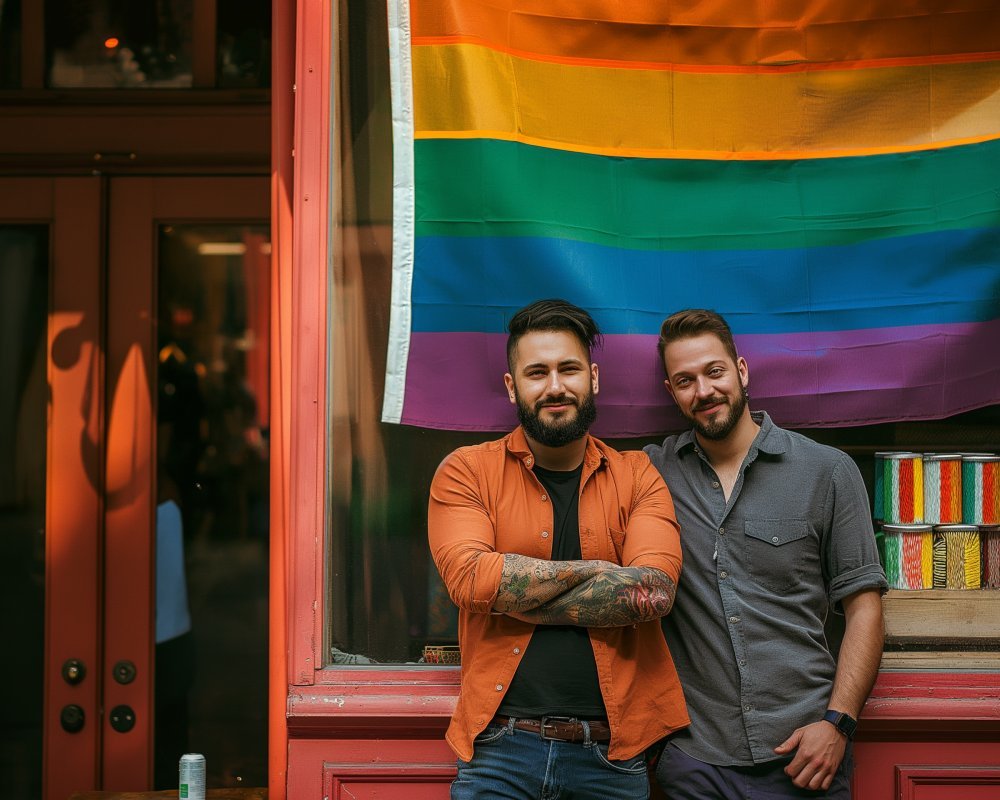
Homie Meaning: A Secret Code for Being Gay or Bi? Exploring the Hidden World of Masculine Men Who Fear Being True to Themselves
1. Introduction: “Homie” and the Hidden Ties That Bind
In countless neighborhoods—urban, suburban, or rural—you’ve likely heard the term “Homie.” For decades, it’s been used broadly, meaning something along the lines of a friend, a close pal, or a trusted companion. Hip-hop culture popularized it further, and it quickly spread across racial, ethnic, and even class lines. Yet, in some contexts, especially in the Black community, Hispanic community, and among certain groups of White guys, “Homie” might be more than mere slang. It can be a protective mechanism—an outwardly innocent label that, behind closed doors, signifies deeper emotional or physical intimacy.
This blog post unearths the phenomenon of “Homie” as a secret code: a discrete way for men to maintain closeness or sexual connections with other men while avoiding suspicion in mainstream circles. Many fear that openly identifying as gay, bisexual, or “somewhere in the middle” could lead to dire social and familial consequences. Indeed, a surprising number of men appear to live a “down-low” existence, using “Homie” or similar slang to camouflage same-sex attractions.
Why do they do this? What drives men—some with wives, children, and hyper-masculine images—to adopt covert strategies? And is it true that there’s a huge undercurrent of men (with “15% straight, 10% gay, 75% bisexual” being one rumored breakdown) who keep their male-male desire hidden? We’ll examine these questions, weaving in historical perspectives, cultural factors, psychological tensions, and personal anecdotes.
By journey’s end, you may see “Homie” in a new light—recognizing it as a cloak for many men who are caught between the desire for authenticity and the fear of discrimination. This exploration urges empathy for those navigating these hidden lives, and it prompts reflection on how we, as a society, can foster a more open and accepting environment.

2. The Questionable Statistic: 15% Straight, 10% Gay, 75% Bisexual
A recurring figure in certain online discussions claims that 15% of men are purely straight, 10% are gay, and 75% are bisexual. Let’s unpack that:
- Scientific Basis or Myth? Reputable surveys (e.g., from The Kinsey Institute, various national research bodies) haven’t confirmed such a neat breakdown. Sexuality is notoriously difficult to quantify, and many individuals are reluctant to disclose same-sex inclinations, particularly in stigmatized settings.
- Fluidity of Sexuality: Kinsey’s famous “scale” concluded that human sexuality often resides along a spectrum. Possibly, many men do experience attractions to multiple genders at different intensities or times, but turning that into a universal statistic is tricky.
- Social Media Influence: This 15/10/75 claim might have emerged from anecdotal observations or smaller subcultures where men are more open about fluid attractions. Or it could be an oversimplified urban legend. Regardless, it underscores the hypothesis that a large chunk of men (far more than openly identify) experience some level of same-sex desire.
While we can’t treat the 15-10-75 ratio as scientific fact, it does highlight a persistent belief that there’s a silent majority of men—especially masculine men—who aren’t 100% straight but remain closeted or discreet for fear of backlash. And if those men find themselves in a society still marred by homophobia, it’s no wonder that “Homie” might become a coded term, letting them share closeness without setting off alarm bells.
Advertisement · Scroll to continue
Recommended
3. Homie as Slang: History, Cultural Reach, and Modern Twists
3.1 Etymological Roots
- “Homie” is believed to be derived from “homeboy,” “homegirl,” or “home slice,” referencing someone from the same “hood” or neighborhood—someone you trust.
- The word soared in popularity through rap and hip-hop lyrics, gradually crossing into mainstream usage.
3.2 Cultural Adoption
- Black and Hispanic Communities: Vital in popularizing “Homie.” Often, it’s just normal jargon indicating deep friendship.
- White Guys, “Bikers,” and Others: People from all racial backgrounds or subcultures have embraced “Homie,” typically to express casual closeness or camaraderie.
- No Single Definition: Because it’s so ubiquitous, it’s crucial to note that most people using the word “Homie” probably do so in a purely platonic sense.
3.3 The New Twist: Secret Code for Same-Sex Desire
As acceptance for open homosexuality lags in certain social circles, some men weaponize cultural slang as camouflage. “Homie” remains so neutral that it rarely prompts suspicion. Yet, for closeted or bisexual men, it might be loaded with subtext.
Is “Homie” a Lowkey Way to Be Openly BI/Gay? Possibly for certain men. For them, the comfort in calling someone “Homie” goes beyond buddy-buddy language—it’s a cryptic admission of their emotional closeness or physical attraction, hidden in plain sight.

4. Social Constraints: Why Men Hide Under the Façade of Heterosexuality
To understand the impetus behind secret-coded language like “Homie,” consider the social constraints that perpetuate male closeting:
- Family Expectations: Many men are raised with the belief that they must marry a woman, have children, and fulfill traditional “provider” roles.
- Religious Doctrines: Certain faiths condemn homosexual activity, branding it sinful or taboo. That moral weight can push men to hide.
- Workplace Homophobia: Some industries remain homophobic—be it old-school sports, certain blue-collar trades, or corporate environments with underlying biases. Fear of losing job security or promotions can lead men to keep quiet.
- Community Standing: In certain black or Hispanic neighborhoods—also sometimes in rural white communities—hyper-masculinity is revered. Being labeled gay might jeopardize social acceptance or even provoke violence.
These pressures converge, leaving men to seek an outwardly “hetero” identity while pursuing covert same-sex relationships—potentially signaled by calling close partners “Homies.”
5. The Perfect Family Man? The Wife, Kids, and Down-Low Life
A significant part of this phenomenon is the “down-low” lifestyle: men appear as perfect husbands and fathers but secretly “cruise” for male companionship. Although the wife and children might suspect something is off, they can’t definitively prove it, especially if the man is adept at weaving a carefully guarded narrative.
5.1 Maintaining Appearances
- Public Persona: At church, family reunions, or neighborhood barbecues, these men display typical fatherly affection, referencing how “the wife and kids are everything.”
- Private Realities: Late-night meetups or coded texting with “Homies,” sharing innuendos hidden behind ordinary language like “Just going to watch the game with my Homie.”
5.2 Emotional Toll on the Family
- Wives often sense an emotional distance or disinterest, attributing it to work stress or personal issues.
- Children might pick up subtle signs of tension.
- In some unfortunate cases, families eventually discover the truth, leading to heartbreak or confusion—though many men remain undiscovered for years.

5.3 Why Not Just Come Out?
- Fear of losing the respect of loved ones, potential legal battles over custody, or the humiliation of “failing” at the conventional hetero life often cements them in secrecy.
- Some men do love their wives but are also physically or emotionally drawn to men, complicating everything.

Advertisement · Scroll to continue
Recommended
6. Masculinity, Fear, and the Discreet Use of “Homie”
6.1 Machismo and the “Bromance” Disguise
Culturally, a “bromance” is somewhat accepted. Men can be best friends, slap each other’s backs, wrestle playfully, or share sports mania. This comedic take on male closeness is ironically a great cover for men who want more intimacy but don’t want to broadcast it as romantic or sexual.
In a typical “bromance,” you might hear phrases like “That’s my Homie for life,” or “We do everything together, we’re bros.” But occasionally, these men may be physically intimate behind closed doors. The slang “Homie” ensures that everyone else remains oblivious.
6.2 Cultural Variation
- Black & Hispanic Scenes: Terms like “Homie,” “Bro,” or “Ese” might have a deeper aura of masculinity. Using them to hide queer connections can ironically thrive in contexts where overt queerness is scorned.
- White Biker or Fraternity Circles: In frat houses or biker clubs, men might ironically or half-jokingly use “Homie.” This comedic approach can be a perfect cloak for hidden desires.
- Class and Age: Younger men or those in less conservative professions might be more comfortable using “Homie” as a code than older men from extremely conservative families.
6.3 “Homie” Head Slang: A Subculture?
Some anecdotal references mention “homie head,” a playful or comedic phrase implying sexual favors or an inside joke among men. Whether it’s wide-reaching or confined to smaller subcultures, it’s another sign of a coded language ensuring plausible deniability. “Homie head” might seem like just a comedic term, but for men in the closet, it’s a nudge-and-wink form of acknowledging deeper intimacy.
7. Homie as a Secret Code: How Queer Men Use It to Stay Lowkey
7.1 The Unspoken Agreement
When two men realize they share same-sex attraction but can’t openly declare it, they may develop an unspoken agreement:
- They call each other “Homie” in public or around acquaintances, framing their closeness as purely platonic.
- They keep no digital trace of romantic messages, or if they do, it’s coded as “bro talk.”
- If confronted, they laugh it off: “We’re just homies chilling, nothing else to see here.”
7.2 Subtle Intimacies
- Extended Eye Contact: They lock gazes a second too long for “friends.”
- Secret Gestures: A certain handshake or coded phrase might exist, ensuring each knows when an intimate rendezvous is next.
- Shared Humor: Inside jokes referencing gay-coded experiences but disguised as typical “friend banter.”

7.3 Boundaries and Tensions
This hidden dynamic can be incredibly intense. Some men experience jealousy if their “Homie” flirts with an unsuspecting female coworker or invests heavily in new social circles. Emotional strain builds as they try to maintain both a mainstream identity and a hidden romance.

8. Historical Perspectives: Ancient Same-Sex Practices Not “Gay”
In discussing how “Homie” might echo certain ancient cultural norms, recall that many historical societies had same-sex intimacy or male bonds that we wouldn’t label “gay” in the modern sense. For example:
- Ancient Greece: Relationships between older men and younger men were sometimes accepted, framed as mentorship or camaraderie. The term “homosexual” didn’t exist; these bonds were integrated into society.
- Samurai Traditions: In feudal Japan, certain samurai had “wakashu” relationships with younger warriors—again, not labeled as “gay” but recognized forms of closeness.
- Native American Two-Spirit: In some indigenous communities, fluid sexual or gender roles were viewed as natural, not singled out as “homosexual” or “heterosexual.”
In these contexts, men might have had wives and families but also engaged in same-sex intimacy as part of culture or personal preference. They didn’t consider it contradictory or “gay.” Similarly, “Homie” might be a modern reflection: men can share intimate, sexual, or emotional bonds yet disclaim them as “just something we do,” refusing the gay label.
9. Sacred Slang: “Homie” as Modern Echoes of Historic Male Intimacy
For men who fear the label “gay” or “bisexual,” “Homie” can be a “sacred slang,” reminiscent of how older societies had cryptic ways of acknowledging same-sex relationships without naming them. A short list:
- Commitment Without a Name: They might feel a profound bond akin to romantic or marital ties, but keep it nameless or coded.
- Brotherhood or Rite: Some treat it almost like a spiritual brotherhood, forging deep loyalty beyond casual friendships.
- Protection from Society: Just as ancient societies used established frameworks to shield their male-male relationships from scorn, the modern “Homie” framework grants plausible deniability.

10. Bromance vs. Secret Romance: Where Does “Homie” Fit?
10.1 The Bromance Phenomenon
Popular culture over the past two decades has embraced “bromance,” describing a close, even affectionate male friendship that remains (ostensibly) non-sexual. Hollywood comedies, comedic sketches, and social media hype have normalized men hugging or emoting to some degree.
But “bromance” is typically a proud label, not meant to hide anything. It’s open and comedic, often used by guys who feel comfortable enough in their masculinity to show warmth.
10.2 Where “Homie” Crosses the Line
When the relationship includes covert sexual or romantic elements, the word “Homie” might become:
- A constant companion for describing the other man to avoid suspicion.
- An alibi for late nights or weekend getaways (“Just chilling with my Homie, honey!”).
- A fallback phrase that allows them to share inside jokes about their intimacy without alarming others.
Hence, “Homie” can jump from signifying a fun, open-minded bromance to signifying a truly closeted same-sex romance—stealthy, loaded with tension.
11. Homie Head Slang: A Subculture of Covert Expressions
As alluded to in some circles, “homie head” may refer to sexual acts or playful jokes about hooking up. While not universally recognized, such slang might flourish in certain subcultures:
- Locker Room Banter: Some men half-joke about it, never acknowledging actual fulfillment of those jokes.
- Deny, Deny, Deny: If confronted, they brand it “just kidding.” Yet, behind the scenes, it might be real.
- Reinforcing a “No Homo” Mindset: In hyper-masculine circles, men might say “Pause” or “No Homo” to disclaim real intentions. “Homie head” ironically normalizes or half-legitimizes it by presenting it as comedic or trivial.

12. From Friendship to Queer Code: The Meaning Behind “Homie”
Is “Homie” a Hidden Term for Being Gay? Some say yes, but with caveats. Not everyone who says “Homie” is gay, just like not every man who calls a buddy “bro” is in love with him. But in the hush-hush world of closeted men, language can’t be taken at face value. “Homie” becomes part of an elaborate disguise—both men know the real nature of their connection, while outsiders remain in the dark.
13. Case Studies & Anecdotes: “He’s My Homie” or “He’s My Lover?”
Consider these hypothetical scenarios:
Scenario A: The Down-Low Cousins
- Two cousins (both mid-20s, from a conservative Hispanic family) label themselves “homies” every day. They share a house, finances, and even sleep in the same bedroom. Family shrugs it off as them being tight-knit cousins or “brothers.” In reality, they’re intimately involved, terrified to admit it to anyone.
Scenario B: The Biker Bros
- A White biker and his longtime friend call each other “homies” and frequently do cross-country rides. They share a tent at rallies, always deflecting suspicion by boasting about “chasing women.” Actually, they’re each other’s emotional anchor, occasionally engaging in sexual contact.
Scenario C: The Church Deacon & His Homie
- An African American deacon in a strict church who preaches against homosexuality has a best friend he calls “my homie.” They watch sports, go fishing, and share “accountability time.” The friend is single and admired by congregants. Behind the scenes, their bond transcends platonic brotherhood, and they tiptoe around church members to keep it hidden.
In each scenario, “Homie” is the perfect shield—casual yet intimate, nondescript yet occasionally brimming with coded signals.

14. In Their Own Words: Men Who Struggle With The Closet
Many men living these realities speak of:
- Emotional Turmoil: They love their wives or children but also feel strong same-sex desires. “Homie” relationships become an outlet that alleviates but also intensifies guilt.
- Fear of Discovery: The possibility of losing everything—job, social standing, custody of kids—looms large.
- Resentment of Societal Judgment: They blame a homophobic culture that won’t let them be open about who they are.
Some eventually reach a breaking point and come out, while others remain locked in this arrangement indefinitely.
15. Signposts of a Secretly Gay “Homie” Relationship
Here are possible (but not definitive) clues:
- Excessive “Homie” Use: Repeatedly referencing “He’s my Homie” when no one asked.
- Over-Defense: If teased about being more than friends, strong denial or anger.
- Private Rendezvous: Meeting times kept secret from family. They claim “just gaming at his place,” but come home with suspicious new stories.
- Subtle Physicality: Frequent “wrestling,” “play-fighting,” or close contact beyond typical friendship norms.
- Jealousy: They become moody when the other is dating women or spending time with new male pals.
Again, men can be extremely close pals without being closeted lovers. But taken in aggregate, such patterns might point to deeper intimacy.

16. Impact on Wives, Partners, and Families
Tragically, the wives or girlfriends of closeted men often sense emotional distance or sexual disinterest. They might discover texts or hints of “homie romance” and feel betrayed. Children can feel tension without knowing its source. The entire family dynamic can unravel if the secret bursts into the open. Yet, many men remain functional fathers and spouses, carefully segmenting their double life to reduce suspicion.
17. How “Homie” Became a Secret Word for Gay Men: Myth or Reality?
Is it a universal phenomenon that “Homie” = gay/bi code? Certainly not. Millions of men use “Homie” with no hidden agenda. But in certain pockets—particularly among men who fear homophobia—the phenomenon is real enough to draw attention. Through testimonies in online forums, anecdotal stories, and counselor observations, we see how men deploy “Homie” as a shield.
Myth or reality? Possibly both. For many, it’s purely platonic slang. For some, it is absolutely a covert signifier, forging a subculture of hidden desire disguised by mainstream vocabulary.

18. Is “Homie” a Lowkey Way to Be Openly BI/Gay?
In a sense, yes. If two men “in the know” consistently call each other “Homie” while sharing a deeper bond, the word can be a subtle middle finger to oppressive norms. They’re effectively saying: “We are more than friends, but we’ll adopt a socially approved label to keep the peace.” It’s an odd synergy of defiance and caution.
But “openly bi/gay” might be too generous a term—they’re not fully open. They remain hidden, with only the slightest linguistic nudge pointing to an unspoken truth. That partial openness might still yield some emotional relief, though it can also perpetuate the stress of living a double life.
19. Overcoming Fear: Finding Authenticity & Support
For men feeling trapped in “Homie-coded relationships,” there are steps to reclaim authenticity:
- Therapy & Counseling: A therapist specialized in LGBTQ+ issues can be a lifeline, offering coping tools for shame, fear, or conflict.
- LGBTQ+ Community Groups: Engaging with discreet support circles or online platforms helps men realize they’re not alone.
- Gradual Coming-Out Plans: Some decide to confide in a few trusted friends or siblings first, then slowly expand their circle of openness.
- Honest Conversations: For those with wives or girlfriends, an honest talk (though painful) can sometimes lead to mutual understanding or at least clarity.
While not everyone can or will come out—some remain in the closet for life—these resources provide glimpses of hope for those longing to end the secrecy.

20. The Road Ahead: Could “Homie” Evolve Beyond Code?
As younger generations become more comfortable with fluid orientations and same-sex relationships, the need for clandestine terms like “Homie” might decrease. Alternatively, the word might shift meaning again, becoming purely mainstream or ironically referencing a bygone era of hush-hush homosexuality. Cultural language is forever in flux.
For now, “Homie” stands at an intriguing crossroads: a widespread slang for friendly connection and, in certain circles, a vital code letting men maintain same-sex bonds under the radar. If acceptance continues to expand, fewer men may feel compelled to use cunning linguistics to hide their truths. Instead, they might say, “He’s my boyfriend,” “He’s my partner,” or simply “We love each other, deal with it.” That day cannot come fast enough for those burdened by closets.
21. 40 Popular Questions & Answers About Homie, Masculinity, and Being in the Closet
Below are 40 frequently asked questions that arise when discussing how “Homie” might function as a discreet LGBTQ+ code, and the broader phenomenon of men hiding same-sex desires.

1. Q: Is every man who says “Homie” secretly gay or bi?
A: Definitely not. Most men use “Homie” with no hidden meaning. Only a subset uses it as a veil for closeted intimacy.
2. Q: Why do men fear being honest about their attractions?
A: Because of social stigma, fear of family rejection, religious condemnation, or risking jobs and friendships.
3. Q: What does the 15%/10%/75% statistic really mean?
A: It’s not verified by formal research. It reflects an online rumor suggesting many men have fluid attractions beyond strict gay/straight labels.
4. Q: Could men in hyper-masculine cultures use “Homie” to hide romance?
A: Yes. In communities where “being gay” is frowned upon, adopting a tough, straight persona and calling a romantic partner “Homie” is a stealth solution.
5. Q: How does “Homie” differ from “Bro” or “Dude”?
A: They’re broadly similar. “Homie” specifically connotes closeness from shared backgrounds. Some closeted men prefer it for a more intimate ring.
6. Q: Isn’t a “bromance” just harmless?
A: Yes, many bromances are purely platonic. However, some closeted relationships masquerade as bromances to avoid suspicion.

7. Q: Do wives always suspect something if their husbands overuse “Homie”?
A: Not necessarily. Many interpret it as standard guy slang. However, some wives sense deeper issues if other suspicious behaviors align.
8. Q: Can “Homie” usage lead to confusion among actual platonic friends?
A: Possibly. If one friend is truly gay/bi and seeking more, while the other is strictly straight, misunderstandings can arise.
9. Q: Historically, were same-sex relationships hidden behind coded words too?
A: Yes, in various cultures, people used discrete languages or traditions to safeguard male-male intimacy from censure.
10. Q: Why not come out rather than relying on coded language?
A: Fear of losing family, social status, or religious acceptance can be overwhelming. Many prefer partial secrecy to overt confrontation.
11. Q: Is the use of “Homie” to hide romantic feelings common?
A: Hard data is limited. Anecdotally, it appears in certain contexts, but it’s not universal.
12. Q: Could “Homie” be used by women in the same way?
A: Women often have different social norms around same-sex closeness. The phenomenon described here is more specific to men’s homophobia-laden environments.

13. Q: Do men who do this see themselves as gay, bi, or something else?
A: Many reject official labels, focusing on emotional or sexual connection with men while outwardly claiming heterosexuality.
14. Q: How does religion affect closeted men’s usage of “Homie”?
A: Strict religious communities can heighten homophobia, making coded language even more essential for survival.
15. Q: Does “Homie” usage vary by region?
A: Possibly. Urban areas might see more fluid acceptance, while rural or certain cultural enclaves remain stringent, intensifying the need for coded words.
16. Q: Could a man be out as bisexual but still say “Homie” for a partner?
A: Sure, though it’s less common. Typically, it’s used where he’s not comfortable being out.
17. Q: Are closeted men who use “Homie” harming themselves or others?
A: Living inauthentically can cause mental strain. Wives or girlfriends might also experience betrayal if they find out. However, these men often feel forced by societal constraints.
18. Q: Do younger generations use “Homie” differently from older ones?
A: Younger men might be more open-minded about sexuality, using “Homie” ironically or casually. However, closeted contexts still exist among youths facing homophobia.

19. Q: Could “Homie” be used among openly gay men with no fear of stigma?
A: Yes, openly gay men might reclaim “Homie” for comedic or affectionate effect, but that’s different from the closeted usage described here.
20. Q: How do men manage jealousy within these “Homie” relationships?
A: Quietly, often with arguments that can’t be fully explained to outsiders. They may label it as “guy drama,” hiding the romantic undertones.
21. Q: What if a closeted man’s “Homie” is also closeted?
A: Then it’s a mutually beneficial arrangement, though the secrecy can double. They protect each other’s facade but also risk heartbreak if one partner eventually leaves or “comes out” alone.
22. Q: Are there any known “Homie relationships” that successfully transitioned into open same-sex relationships?
A: Yes, some men eventually come out publicly, adopting normal “boyfriend/partner” language. Others never do, staying hidden for life.
23. Q: Is “Homie” used internationally or just in the U.S.?
A: Mostly U.S. slang, but American pop culture’s global reach means pockets abroad might adopt it. The closeted phenomenon is universal, but the specific word usage may vary.
24. Q: Do mainstream LGBTQ+ communities discuss “Homie coding”?
A: It’s less studied academically. However, anecdotal references abound on social media, vlogs, or down-low message boards.

25. Q: Could an openly gay man use “Homie” ironically with his partner?
A: Absolutely. Some do it playfully. The difference is they’re not using it as a ruse to hide orientation.
26. Q: What about men who are not fully closeted but not fully out?
A: They might use “Homie” in certain conservative settings but feel free to express same-sex affection in more liberal contexts. It’s a situational closet.
27. Q: Is using “Homie” in this covert manner healthy?
A: It can reduce short-term conflict, but in the long run, living behind any facade can be psychologically burdensome.
28. Q: Does the usage link back to internalized homophobia?
A: Often, yes. Men internalize society’s negative views on homosexuality, seeking protective disguises like “Homie.”
29. Q: Are there better solutions than using code words?
A: In an ideal, accepting world, men wouldn’t need code words. Therapy, support groups, or relocating to more open communities can help them live authentically.
30. Q: How does “Homie” usage tie into “Bro job” references found online?
A: “Bro job” similarly comedic references to discreet male-male sexual acts among “straight bros.” “Homie” is a linguistic parallel—both reflect hidden or trivialized intimacy.

31. Q: Do the men themselves always see “Homie” as a code?
A: Not always consciously. Some might have simply normalized the term, while others intentionally exploit its neutrality to conceal deeper meaning.
32. Q: Has social media impacted the phenomenon?
A: Yes, men can maintain illusions on platforms by calling each other “Homie” in public posts, while direct messages reveal romantic or sexual truths.
33. Q: Is there a female equivalent slang for closeted relationships?
A: Women’s same-sex relationships sometimes hide under “girlfriend” or “bestie,” but the dynamics of stigma differ. This blog focuses on masculine-coded usage.
34. Q: Are closeted “Homie” relationships typically monogamous or multiple?
A: It varies. Some men have a single “Homie” lover; others keep multiple connections. The motivations revolve around convenience and emotional needs.
35. Q: Could “Homie” also hide non-sexual emotional intimacy?
A: Absolutely. Some men yearn for male emotional closeness, not necessarily sexual. “Homie” can mask a deeper emotional bond that surpasses typical “friendship.”
36. Q: Do men often slip up and let people know “Homie” is more than a friend?
A: Sometimes. Drunken confessions or texting mishaps can expose secrets. Skilled closeted men cultivate caution, but accidents happen.

37. Q: Are there celebrities rumored to use “Homie” similarly?
A: There have been gossip items about certain rappers or athletes rumored to be in closeted relationships, though rarely substantiated. Officially, no big star has publicly claimed “Homie” for a lover.
38. Q: Does “Homie” usage in the workplace differ?
A: In professional settings, men might curb slang altogether. If used, it’s typically “buddy” or “pal,” but closeted men might still refer to a coworker or friend as “Homie” when among peers.
39. Q: If I suspect my friend is using “Homie” as code, should I confront him?
A: Tread gently. Let him open up on his own terms. Pressuring might cause him distress or push him away. Offer a safe space to talk.
40. Q: Could “Homie” eventually lose all subtext and just revert to mainstream slang again?
A: Quite possibly. Language evolves. As social acceptance grows, men might become more direct, and “Homie” might revert to a purely innocent term with no hidden connotation.

22. Conclusion: Respect, Empathy, and a Path to Openness
“Homie” remains a fascinating intersection of mainstream slang and secret-coded expression. On one hand, it’s a harmless, culturally ubiquitous term signifying friendship or camaraderie. On the other, it can serve as a subterranean channel for men—those who identify as gay, bisexual, or otherwise same-sex inclined—to slip under society’s radar without rocking the boat.
But let’s not forget the heart of the matter: the men behind the code words. Many live in fear—fear of rejection, condemnation, or losing their carefully orchestrated lives. They use “Homie” out of necessity, even longing for a day they can drop the code and love openly. That day might come sooner if we collectively push for broader acceptance, ensuring no one has to hide behind slang or illusions to feel safe, valued, and free to be who they are.
Until then, “Homie” stands as a subtle beacon, bridging platonic illusions and closeted truths. It’s a testament to the resilience of human intimacy under duress—a quiet revolution in plain sight. If you suspect a friend is harnessing “Homie” as a shield, respond with kindness, confidentiality, and understanding. Ultimately, the path from forced secrecy to genuine authenticity benefits not just them, but society as a whole.
Advertisement · Scroll to continue

More Recommended
Can Gays Have Successful Marriages?
Can Gays Have Successful Marriages? – Can Gays Have Successful Marriages?Marriage has long been considered [...]
999 Funny Gay Jokes
999 Funny Gay Jokes Need a serotonin boost that lasts longer than bottomless mimosas? You’ve [...]
Funny Gay Dad Jokes: 100+ Jokes Your Dad Would Steal
Funny Gay Dad Jokes: 100+ Jokes Your Dad Would Steal. Laugh out loud with this [...]
Reaching a new demographic: the rise of Lesbian-friendly businesses
Tapping into an Untapped Market: The Growth of Lesbian-Friendly Businesses The LGBTQ community has made [...]
How Gay-Friendly Marketing is Changing the Web
How Gay-Friendly Marketing is Changing the Web The LGBTQ+ community has long been an underserved [...]
From Margins to Mainstream: How a Lesbian Marketing Agency is Driving Change
From Margins to Mainstream: How a Lesbian Marketing Agency is Driving Change In today’s world, [...]
How a Lesbian-Owned Marketing Agency is Making an Impact
The Power of Representation: How a Lesbian-Owned Marketing Agency is Making an Impact In today’s [...]
How do you say you are LGBTQ-friendly?
How do you say you are LGBTQ-friendly? – Understanding how to communicate that you are [...]
How to Be a Better Ally to Gay Co-Workers
How to Be a Better Ally to Gay Co-Workers – Have you ever wondered how [...]